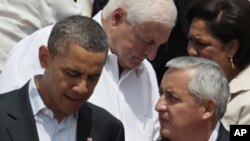Leaders from Latin America, the Caribbean, the United States and Canada have concluded the sixth Summit of the Americas in Cartagena, Colombia. The issue of Cuba's exclusion from the summits, which occur every three years, blocked a final consensus declaration.
In a news conference, U.S. President Barack Obama and Colombia's president, Juan Manuel Santos, sought to stress areas of agreement from a gathering whose formal focus was on expanding economic integration, trade and investment, and regional security.
However, in the end, it was the issue of Cuba's exclusion from the summits that grabbed the top headline.
Though Cuba is not democratic, a majority of nations in the hemisphere support its participation in future summits. The U.S. and Canada oppose this, saying Cuba needs to undergo political and human rights reforms.
President Obama said there is a lack of consensus on Cuba. He reiterated the U.S. position on the need for political and human rights reforms in Cuba and said he told other leaders there may be an opportunity for Cuba to participate if the government in Havana allows changes. "There may be an opportunity in the coming years as Cuba begins to look at where it needs to go in order to give its people the kind of prosperity and opportunity that it needs, that it starts loosening up some of the constraints in that country. And that is something that we will welcome," he said.
President Santos said all discussions at the summit, including those on Cuba, were open and respectful. "In summits such as these, where 33 countries participate, each one bringing to the table their own interests, each one bringing their own prism through which they look at things, but the positive thing is that we discuss these issues candidly and productively," he said.
Earlier, Mr. Obama and President Santos held formal bilateral talks, discussing Colombia's economic and security progress after years of battling narco-traffickers and FARC guerrillas.
They also announced that a U.S.-Colombia free trade agreement will become effective on May 15. Initiated under the administration of U.S. President George W. Bush, it will greatly expand duty free treatment for U.S. manufactured and agricultural exports to Colombia.
Though it has business community support, the accord is still opposed by some U.S. labor unions, which say Colombia has still not done enough to eliminate violence against unionists and ensure investigation of past crimes.
U.S. Trade Representative Ron Kirk, in Cartagena with the president, said Colombia has taken necessary steps to more robustly support its labor laws. "In particular, the rights of workers to organize and a number of important steps and procedures that have been in place to prosecute past cases of violence against union organizers as well as providing protection for them," he said.
Another major topic involved arguments by regional leaders for the U.S. and Canada to consider alternatives to current strategies in the war on illegal drugs, including drug decriminalization.
Mr. Obama had informal talks with the presidents of El Salvador and Guatemala, both among Central American nations grappling with drug violence.
A senior administration official said Mr. Obama also spoke with Peru's president, Ollanta Humala. The U.S. is to send a delegation to a drug policy meeting Peru is hosting in June.
President Obama also met with leaders from Caribbean nations. President Obama and U.S. officials have underscored Washington's support for the region under a $200 million Caribbean Basin Security Initiative.
Before leaving Cartagena, President Obama joined President Santos in a ceremony marking the Colombian government's program to return land to people displaced by paramilitary militias, FARC guerrillas and narco-traffickers.
Attendance by the first African-American U.S. president was seen as highly significant in Colombia, which has the second largest black population in South America after Brazil. An estimated 20 percent of Colombia's 45 million people have African ancestry.
Mr. Obama's attendance at the summit, and the economic and other issues on the agenda, were to some degree overshadowed by a scandal involving allegations of misconduct by U.S. Secret Service and military personnel involving prostitutes in Cartagena.
Asked about the controversy, President Obama said he expects a rigorous and thorough investigation. But he said he would be angry if the allegations are confirmed, adding he expects those representing the United States to conduct themselves with the "utmost dignity."
News
Cuba Issue Blocks Final Consensus Declaration at Americas Summit
- By Dan Robinson
